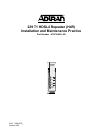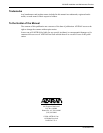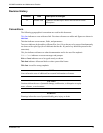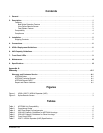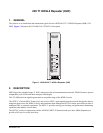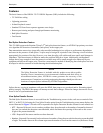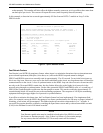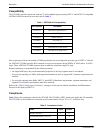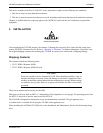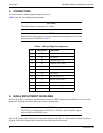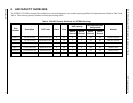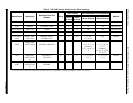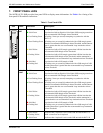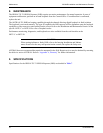
2 61223445L1-5D
Description 239 H4R Installation and Maintenance Practice
Features
The basic features of the HDSL4 239 T1 HDSL4 Repeater (H4R), include the following:
• TC PAM line coding
• Lightning protection
• In-band loopback control
• Standard 239 form factor repeater apparatus case design
• Remote provisioning and pass-through performance monitoring
• Bad Splice Detection
• Fast Retrain
Bad Splice Detection Feature
This 239 H4R supports the Runtime TScan 2.0
TM
bad splice detection feature, an ADTRAN proprietary non-intru-
sive algorithm for detection of anomalies (bad splices) in the copper pair.
Data transmission transceivers (especially echo-cancelled technologies) are subject to performance degradations
and errors in the presence of bad splices. A splice may be benign for a period of time, allowing a circuit to behave
appropriately for portions of the day. However, over time the splice will oxidize and incur small, rapid changes in
impedance. This inconsistency in behavior makes the problem difficult to locate. Additionally, an impedance
change that is large enough to cause the transceiver trouble may still be small enough to be undetected by test
equipment utilized on the copper pairs. Therefore a non-intrusive method of identifying these bad splices has been
developed to aid the customer in troubleshooting their distribution plant.
NOTE
The Splice Detection Feature is included with this product as an aid to trouble-
shooting. Due to inconsistency in environmental conditions and their effect on
telecommunications plant, ADTRAN cannot guarantee the accuracy of the
measurements. Comparison to existing engineering drawings should provide exact
locations of suspect splices indicated by ADTRAN algorithms.
Splices that are varying in impedance will cause the HDSL data pump to see a reduced and/or fluctuating signal
quality (margin). The HDSL data pump will attempt to track these changes. When the changes become too severe,
errors or loss of synchronization result.
View Splice Results Screen
The Bad Splice Detection feature is accessed from the Troubleshooting screen via the craft access terminal of the
H4TU-C or H4TU-R. Selecting the View Splice Results option from the Troubleshooting screen menu displays the
screen illustrated in Figure 2. Results will be reported in the Splice Detection Results column for each transceiver:
• NTF - Reported if the unit is active and no problems have been detected or the number of anomalies detected
have not yet reached the detection count threshold, which facilitates the reporting of the result to this screen.
(Eight is the present threshold.)
• LOS - Reported if the remote unit has not been detected.
• Number - Reported if an anomaly has been detected a number of times that exceeds the detection count threshold
of eight. The number shown in this column represents the number of feet from the transceiver (Reference Point)



